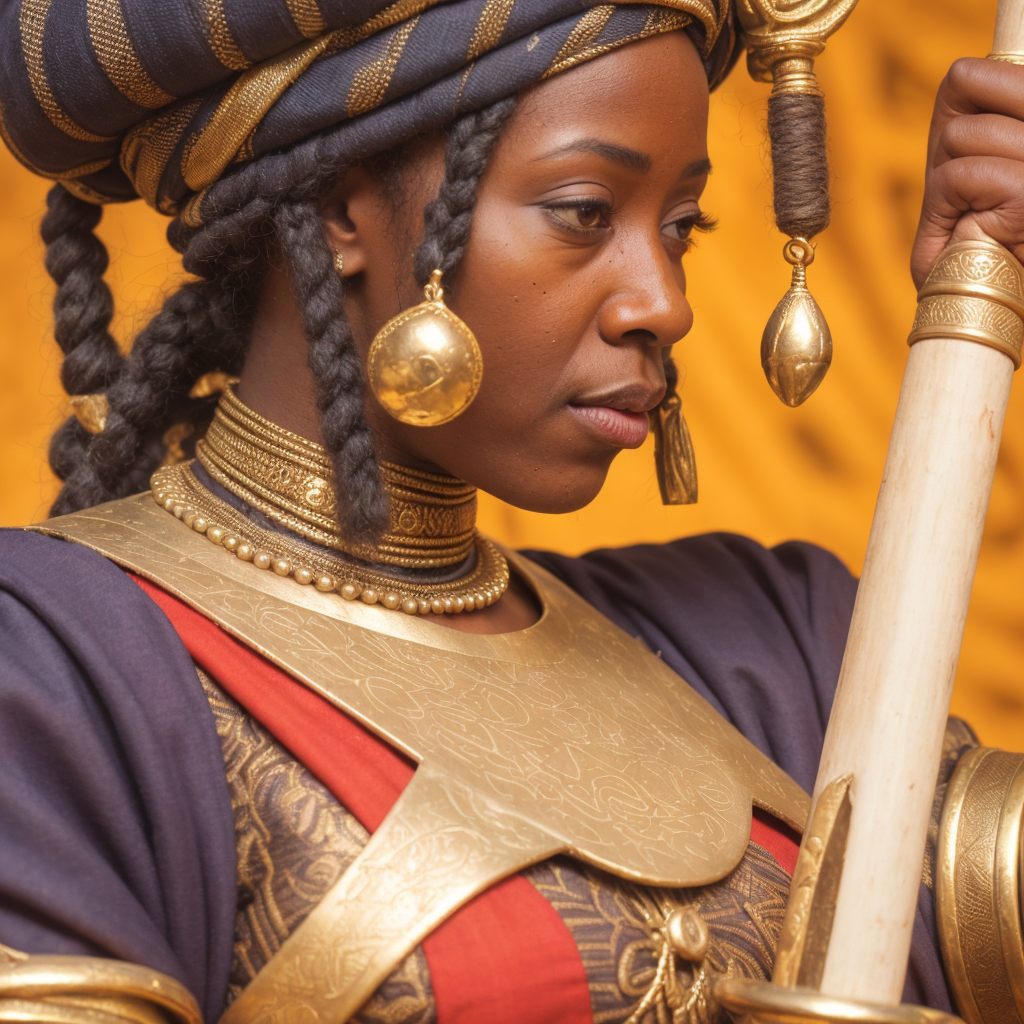
Queen Aminatu Mohamud
Zaria/Zazzau, Nigeria
1533 - 1610
“Amina daughter of Nikatau, a woman as capable as a man.”
- Traditional Hausa praise song
Queen Aminatu of Zaria: Africa's warrior princess who ruled with dignity, grace, and power over a 20000-man army. She was an astute military strategist who used her intellect and prowess to bring about her nation's peace and stability. Not only is the fearless Nigerian warrior queen one of the greatest queens from west Africa, but she is unquestionably one of the greatest queens in all of African history.
Lineage
The warrior Queen Amina, also known as Aminatu, was believed to have been born around 1533 in Zazzau, a province of Zaria now in modern-day northwest Nigeria. She was a Hausa Muslim and eldest daughter to King Nikatau of Zazzau and Queen Bakwa Turunku, the 22nd rulers of Zazzau. She had a younger sister named Zaria, after whom the British renamed the modern city of Zaria in the twentieth century. She also had a younger brother named Karama. She descended from a family of royalty with her grandfather being King Sarkin of Nohir and her grandmother was named Marka.
Early Life
The princess was born into a prosperous family that was well-known for their successful trade and import of metals, leather goods, cloth, salt, and horses. She was not a typical woman of her era. When she was a child, her grandmother discovered her easily wielding a dagger just as easily as any warrior would. She developed a strong interest in warfare and pursued rigorous military training. She was raised and educated in her grandfather Sarkin Nohir's court, where she was highly favored. He carefully instructed her in political and military matters.
Amina was named Magajiya, the heir apparent to her mother when she was sixteen years old. She had a slew of daring suitors who offered her extravagant gifts, including the daily offer of ten Makama slaves. The Emir of Kano also offered her 50 male slaves, 50 female slaves, and 50 bags of white and blue cloth, but she refused to marry or have children.
Queenship and Expansion of Zazzau
It is crucial to note that Queen Amina’s leadership occurred during pre-colonial Nigeria, where men did not feel threatened when women were in powerful positions as they were deemed worthy not by gender but by merit. After the death of Amina’s parents in 1566, her brother Karama ascended to the throne and was given the title King of Zazzau. During this time Amina chose to hone and perfect her military skills by joining the military warriors of Zazzau and this resulted in her emerging as the leader of her brother’s cavalry. During this period, she received numerous military accolades and gained even more respect from the people.
Following her brother's death in 1576, she ascended to the throne as queen and ruled for 34 years, conquering numerous cities and expanding Zazzau territory by waging war against her neighbours only three months after becoming queen. She expanded her kingdom beyond their primary southern and western borders to the greatest extent ever recorded in history. She commanded an impressively well-trained army of 20,000 men and 1,000 cavalry troops, and her first address to them was as follows:
Resharpen your weapons.
The warrior Queen expanded her kingdom’s wealth immensely with gold and slaves. She established commerce in Northern Africa and introduced kola nut cultivation to her kingdom. She was a pioneer of military innovations, including the introduction of metal armour, iron helmets, and chain mail, which provided excellent protection for her soldiers against opposing armies. Additionally, she constructed earthen fortified walls around Zazzau cities to protect her camps and conquered cities, which she dubbed Ganuwar Amina; literally, Amina's walls.
According to legend, she took a new lover in each new area she conquered and had them executed the following day so they would not live to tell the tale.
“Every state paid her tribute. The king of Nupe sent her 40 male servants and 10 000 kola nuts. In her time all the products of the west came to Hausaland.’’
Kana chronicle
Death
Queen Aminatu's death is shrouded in mystery, as the exact circumstances are unknown. Prior to her death, she expanded Zazzau's borders south of the Niger-Benue conference. It is widely believed that she died in 1610 during a military campaign in Atagara.
Historical Mark and Cultural Legacy
“Strange things have happened in the history of the seven Hausa States, and most strange of these is the extent of the possessions which God gave to Aminatu, daughter of the ruler of Zazzau. She waged war in the Hausa Lands and took them all so that the men of Katsina and the men of Kano brought her tribute. She made war in Bauchi and against other towns of the south and of the west so that her possessions stretched down to the shores of the sea.”
Muhammad Bello
Today, Queen Amina of Zazzau embodies strength and womanhood. Without a doubt, she has left a legacy that defies all stereotypes about women's leadership in African societies. The fortifications the warrior erected around the major cities she conquered bear witness to her prowess. Even today, remnants of her palace and military training grounds remain.
She has been honored in numerous ways, including the naming of a government secondary school in Kaduna state after her: Queen Amina College. Female hostels called 'Queen Amina Hall' are located at Ahmadu Bello University, Zaria, and the University of Lagos. Additionally, the Queen Amina Statue at the National Arts Theatre in Lagos State pays tribute to the legendary queen. Queen Amina has inspired numerous novels, as well as a television series in the United States of America called 'Xena: Warrior Princess.
She is immortalized today in traditional Hausa praise songs such as,
“Amina daughter of Nikatau, a woman as capable as a man that was able to lead men to war.”
References
geni_family_tree. 2019. Warrior Queen Amina. [online] Available at: <https://www.geni.com/people/Warrior-Queen-Amina/6000000110296940965> [Accessed 2 May 2021].
Young, S., 2019. Ten of Africa’s Most Powerful Kings, Queens, Warriors and Legends. [online] Ancient-origins.net. Available at: <https://www.ancient-origins.net/history-famous-people/legendary-african-warriors-0011692> [Accessed 2 May 2021].
Agbese, A. (2003). Maintaining power in the face of political, economic and social discrimination: The tale of Nigerian women. Women and Language, 26(1), 18-25.
Bolanle Awe, ed., Nigerian Women in Historical Perspectives (Lagos: Sankore / Ibadan, Nigeria: Bookcraft, 1992)
Janis, Michael. Africa: Journal of the International African Institute 78, no. 2 (2008): 322-24. Accessed May 2, 2021. http://www.jstor.org/stable/29734339.
Africa Heritages. 2016. Queen Amina of Zazzau Kingdom – AFRICA’S WARRIOR PRINCESS. [online] Available at: <https://africaheritages.wordpress.com/2016/09/07/african-queens-princess-aminatu-the-warrior-queen/> [Accessed 2 May 2021].
African Feminist Forum. n.d. Queen Amina of Zaria » African Feminist Forum. [online] Available at: <http://www.africanfeministforum.com/queen-amina-of-zaria-nigeria/> [Accessed 2 May 2021].
Encyclopedia.com. n.d. Queen Amina | Encyclopedia.com. [online] Available at: <https://www.encyclopedia.com/history/news-wires-white-papers-and-books/queen-amina> [Accessed 2 May 2021].
BBC News, 2021. Queen Amina: Nigerian warrior queen. [video] Available at: <https://www.bbc.com/news/av/world-africa-44888718> [Accessed 2 May 2000].
HomeTeamHistory, 2019. The Conqueror Queen Of West Africa: A Brief History. [video] Available at: <https://www.youtube.com/watch?v=iZMoxpv1Sok> [Accessed 2 May 2021].

